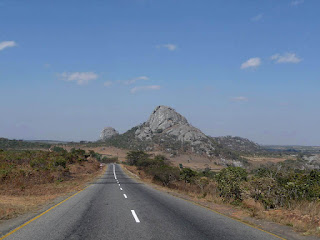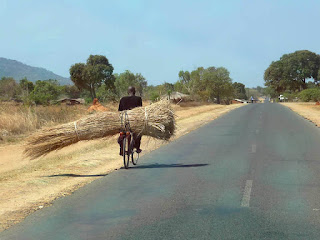20 września wylądowaliśmy w Senga Bay nad jeziorem Malawi. Tam na ładnie położonym ale nieco zaniedbanym kempingu spotkaliśmy sympatyczne małżeństwo: Rosemary i Dave z RPA. Sporo jeżdżą po świecie i często wybierają się swoją świetnie przygotowaną Toyotą 105 na podróże po Afryce. Samochód zapewnia im pełen komfort: namiot dachowy, system szuflad na miarę, zbiorniki na 300 litrów paliwa, lodówka z zamrażarką itd., czyli wszystko o czym marzy auto-podróżnik. Zaimponowały nam także bardzo ich umiejętności kulinarne: mieliśmy okazję zjeść pieczony na węglach drzewnych przepyszny chleb i rozkoszować się kiełbaskami ze strusia.
Wieczorem wskoczyliśmy do jeziora zażyć trochę ruchu. Ciepła woda, piaszczysta plaża a na niej tylko my i 6 towarzyszących nam wiernie miejscowych piesków.
Następnego dnia pojechaliśmy zwiedzić górskie tereny na drodze do Dedza. Zrezygnowani zajechaliśmy tam na stację benzynową i o dziwo, bez kolejek zatankowaliśmy naszego Patrola do pełna. Niestety moja ważność mojej wizy nie pozwalała na zwiedzenie południa kraju, ale po noclegu w górach postanowiliśmy wrócić do piaszczystych plaż i piesków.
W Dedza skorzystałem jeszcze z usług miejscowego mechanika który miał nasmarować wały. Całe podwozie było w tawocie, z wyjątkiem wałów oczywiście.
23 września zameldowaliśmy się na granicy. Oddaliśmy paszporty do kontroli ale coś było z nimi nie tak i pogranicznik zaprosił nas do swego biura. Powiedział mi, że powinienem było puścić Malawi wczoraj, bo oficer imigracyjny w Mzuzu nie potrafił policzyć do siedmiu i wystawił mi wizę o jeden dzień za długą, więc praktycznie przekroczyłem pobyt o 1 dzień. Nie zgodziłem się oczywiście z taką interpretacją słowa pisanego i dałem do zrozumienia by się nie wygłupiali bo nie mamy czasu na takie zabawy. Na to człowiek wyciągnął asa z rękawa i otworzył paszport Basi na stronie z wbitą na granicy wizą, a tam jak byk wielkimi bukwami napisane: pozwolenie na podróż ważne 7 dni. Zmroziło nas bo oznaczało to, że Basia przekroczyła swój pobyt w Malawi o 3 dni. Okazało się, że darmowa wiza dla obywateli brytyjskich nie jest wydawana automatycznie na 30 dni tylko na czas o jaki się wystąpi, nie dłuższy niż 30 dni. Jako, że ja byłem zmuszony do wystąpienia o wizę tranzytową Basi z automatu wbito do paszportu też tranzyt tyle że z datą wjazdu do kraju. Czekały nas duże problemy.
Oficer oskarżył Basię o nielegalny pobyt w Malawi i stwierdził, że jedyna droga postępowania to sprawa sądowa w stolicy i deportacja do Tanzanii, do miejsca w którym przekroczyło się granicę. Stwierdził, że trzeba było w Lilongwe zapłacić i przedłużyć wizę, a na nasze pytanie czy nie możemy tego zrobić na granicy odpowiedział, że nie bo tu nie mogą wystawić pokwitowania za zainkasowane pieniądze. Przyszło jeszcze dwoje innych urzędników by dołożyć swoje 5 groszy do całej sprawy i było naprawdę nieprzyjemnie. Zapytali co mają teraz z nami zrobić, my na to, że powinni puścić nas do Zambii. Stwierdzili, że nie mogą tego zrobić, bo muszą spełnić swe obowiązki służbowe. Siedzieliśmy tak w biurze i nie widać było by nasza sprawa miała się szybko i pozytywnie dla nas zakończyć. Po godzinie negocjacji oficer który nas zatrzymał stwierdził, że musi zadzwonić do swej szefowej by ona postanowiła, czy może nas wypuścić z kraju. Wrócił po chwili i stwierdził, że niestety ale nie możemy wyjechać. Nagle znienacka zapytał nas czy pijemy alkohol i później dowiedzieliśmy się, że był to dla nas sygnał do zapłacenia łapówki. My tego sygnału nie odebraliśmy jak należy, więc pan przeszedł do bardziej otwartej gry i powiedział, że chce nam pomóc i możemy zapłacić, ale on nie będzie mógł wystawić rachunku. Tu Basia nie wytrzymała i zapytała wprost czy to znaczy, że chce on te pieniądze zachować dla siebie, na co zareagował oburzeniem i stwierdził, że oczywiście nie miał tego na myśli. Sytuacja była patowa, minęło 1,5 godziny, człowiek tracił do nas cierpliwość i nagle, ku naszemu zdumieniu wybawienie przyszło z zupełnie nieoczekiwanej strony. Do biura weszła pani która przyniosła dla naszego oficera, człowieka o sporych gabarytach, gorący obiad. Biedny Lucjusz (takie miał cesarskie imię) poddał się zupełnie po rozpakowaniu pachnącego, pieczonego kurczaka. Ostemplował nasze paszporty i tak oto udało nam się wybrnąć z całej sytuacji przy pomocy kury i dzięki cierpliwości.
Wjazd do Zambii to była już bułka z masłem i zdążyliśmy jeszcze przed zachodem słońca na kemping w Chipata.
Lake Malawi and the Zambian border
On the 20th of September we arrived at Senga Bay, Lake Malawi. There, at a beautifully situated, though somewhat rundown campsite we had the good fortune to meet Rosemary and David, a very amiable and well-travelled couple from South Africa. They often tour around Africa in their superbly equipped Toyota 105. Boasting a roof tent, bespoke drawer system, 300-litre fuel tank and a fridge-freezer, it’s a vehicle that many a motorised traveller dreams of. We were also mightily impressed by their cooking skills, being treated to a delicious loaf of freshly-baked cornbread and grilled ostrich sausages, all prepared using only a handful of small charcoals.
In the evening we took advantage of the campsite’s idyllic, sandy beach for a swim in the lake, accompanied only by a pack of six very friendly, though seriously flea-ridden local dogs.
The following day we headed for a drive through a mountain range leading to the town of Dedza. Out of habit rather than any realistic hope we stopped at the local fuel station to make enquiries about diesel and were hugely surprised to discover that it was available and that we could buy a full tank if we wished. Sadly, as Adam’s visa was by now running out it was too late for us to make a trip to the far south of the country, so instead, after a night spent in the mountains, we decided to return to the beach and dogs at Senga Bay.
Whilst still in Dedza we visited a local car mechanic, hoping to have our vehicle’s propeller shafts greased. Regretably, the mechanic managed to coat everything beneath the car in a thick layer of grease, except of course the shafts.
On the 23rdof September we arrived at the border between Malawi and Zambia. We handed over our passports to the Malawi immigrations officer and were immediately invited to come into his office. He informed us that Adam should have left Malawi a day earlier, as the official at Mzuzu was clearly incapable of counting to seven, hence had issued a visa that was one day too long. Naturally, we argued that it was not for us to question the competence of Mzuzu’s immigration officials, hence we had assumed that the validity date stipulated on the visa must be correct. Very unwillingly, the officer conceded that he could just about accept our line of reasoning, but then stunned us by opening my passport to show that it had been stamped at the border on 14.09 with a travel permit valid for only seven days. This meant that I had now overstayed my allocated time in Malawi by three days. We quickly discovered that free entry permits for British citizens are not issued automatically for a 30-day period, but only for the length of time requested, up to a maximum of 30 days. As Adam had been given no choice but to apply for a transit visa, I was automatically also granted a 7-day transit travel permit valid from the day that we’d entered the country. A fine mess!
The official stated that because I was now in Malawi illegally I would have to face a court case in Lilongwe which would result in a substantial fine followed by deportation to Tanzania, where I’d originally crossed the border. He told me that whilst in Lilongwe I should have paid to have my travel permit extended and that it wasn’t possible to sort out an extension at his border post because he couldn’t issue me with a receipt for any payment made. Another two officials arrived to confirm the gravity of the situation. They asked what they should do with us, to which we replied that they should let us deport ourselves by allowing us to enter Zambia. This they deemed to be out of the question, as it meant that they would not be fulfilling their duties correctly. We sat in the office discussing the matter over and over with no prospect of a satisfactory or swift solution. After an hour of negotiations the immigration official who’d detained us said that he was going to ring his boss to ask whether she would let us leave the country unpunished. He came back saying that the answer was a resounding ‘no’. Quite out of the blue, he then asked us whether we like to drink; this we later found out was our cue to offer him a bribe (‘Here’s some money to go and have a drink on us’ should have been our response). Unfortunately for him, we didn’t pick up on this and entered into a discussion about the relative merits of beer and vodka. On reflection, this must have been too much for him to bear, as he immediately decided to go for the direct approach, telling us that he’d love to help us and that we could pay him for the extension, but he wouldn’t give us a receipt. In my naivety and indignation I asked outright whether he was saying that he’d like to keep the money for himself, which provoked an equally indignant reaction, the officer flatly denying that this was what he had in mind. We’d reached a stalemate: an hour-and-a-half had passed and the officer was losing his patience with us. Suddenly, to our complete amazement and great joy, salvation appeared in a most unexpected form. A woman entered the office with a large, steaming hot dinner for our border guard – a man of very generous proportions. Poor Lucius (such was his imperial-sounding name) abandoned his previously unyielding stance after just one sniff of roast chicken. He hurriedly stamped our passports and bid us farewell; and thus it was that we managed to wriggle our way out of a tight spot thanks to a chicken and a liberal dose of patience.
Entering Zambia was simplicity itself and we even managed to reach a campsite in Chipata before sunset.




















